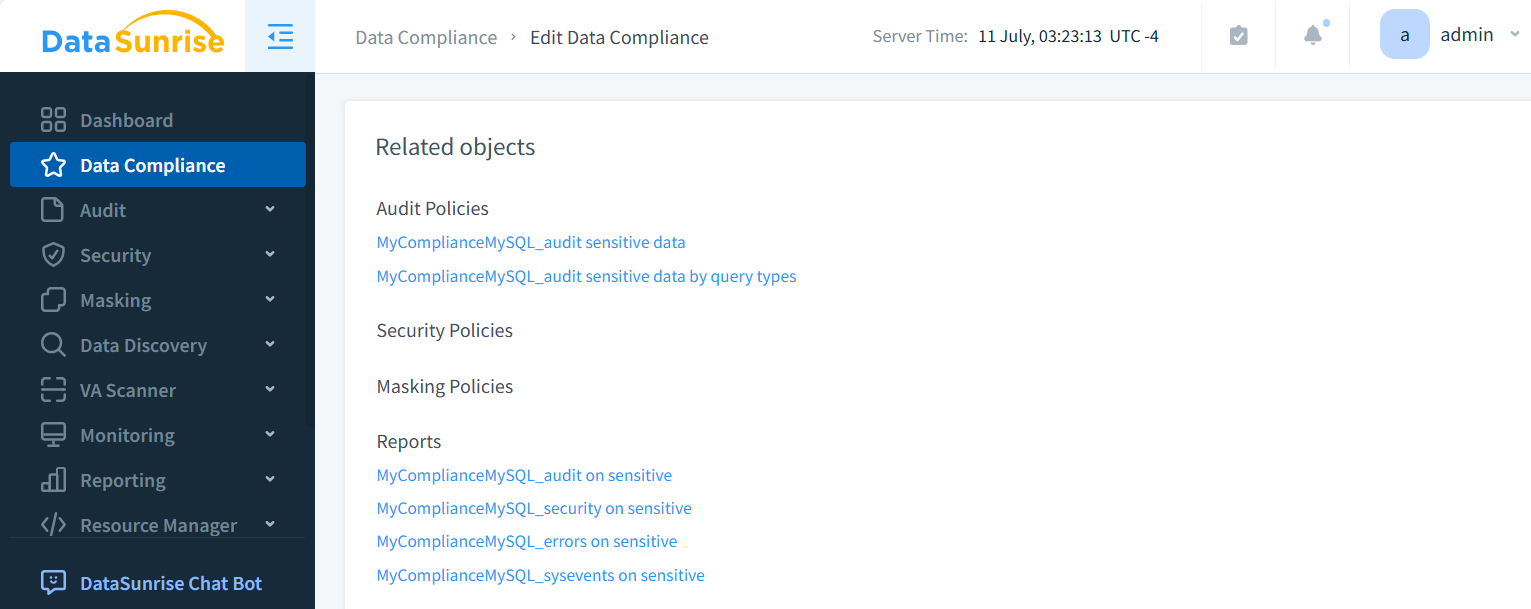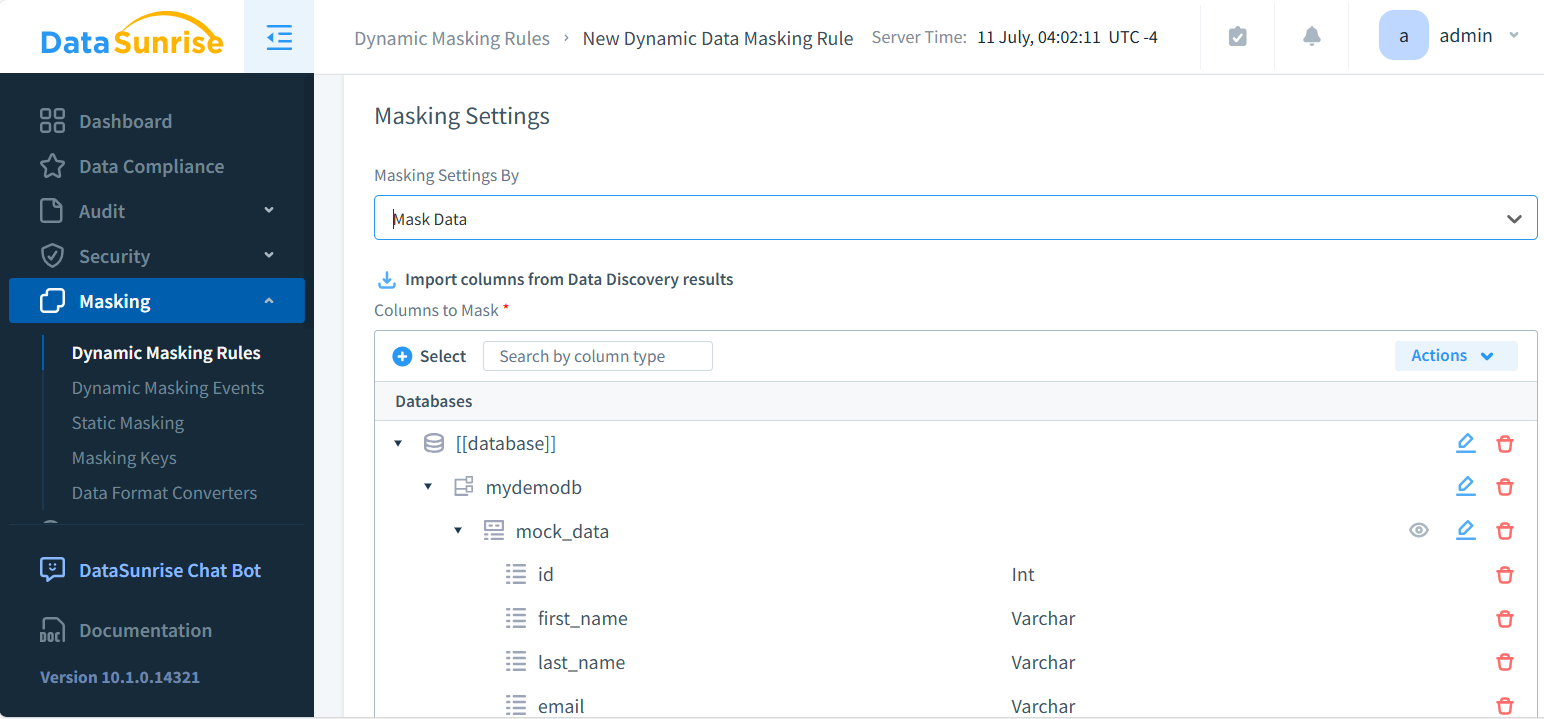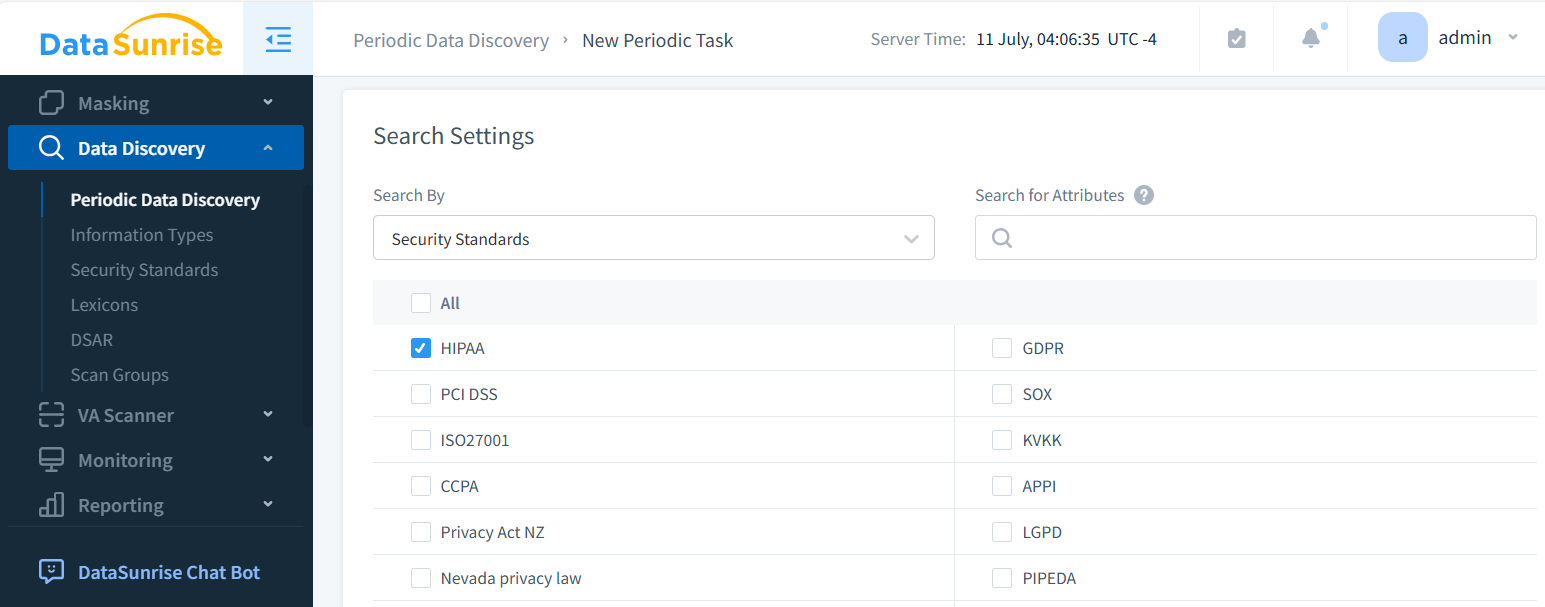
Data Compliance: HIPAA Tests

Introduction
In the era of Big Data, safeguarding sensitive information is not only increasingly complex but critical for maintaining trust and compliance. Healthcare organizations, in particular, face unique challenges when it comes to safeguarding patient data. This is where data compliance and HIPAA test come into play. Let’s learn about how HIPAA tests protect healthcare data and keep it safe and private.
DataSunrise offers powerful features to ensure your databases comply with various regulations. Our comprehensive suite includes advanced data discovery tools, robust masking capabilities, and detailed audit functionalities. These features work well together to help you find sensitive information, protect it, and keep a detailed record of data access. With DataSunrise, you can confidently test your databases against numerous regulations and achieve compliance with ease.

What is Data Compliance?
Data compliance refers to the practice of adhering to laws, regulations, and standards that govern the collection, storage, and use of data. It’s about ensuring that sensitive information is handled correctly and securely. For healthcare organizations, HIPAA (Health Insurance Portability and Accountability Act) is the primary compliance standard.
DataSunrise offers a flexible approach to compliance management. Our platform provides two powerful options:
- Automated Compliance: With just a few clicks, you can generate comprehensive compliance sets. These automatically create a suite of tailored Policies and Reports, saving you time and ensuring thorough coverage. The figure above illustrates the various elements automatically generated in this process.
- Step-by-step Compliance: For those who prefer granular control, DataSunrise allows you to craft and fine-tune each component of your compliance strategy. This option enables you to build policies and reports from the ground up, perfectly aligning with your organization’s unique needs.
Whether you choose automated efficiency or custom precision, DataSunrise empowers you to achieve and maintain compliance with confidence.
Understanding HIPAA and Its Importance
HIPAA sets the standard for protecting sensitive patient data. Any company dealing with protected health information (PHI) must ensure that all required physical, network, and process security measures are in place and followed.
Key Components of HIPAA
- Privacy Rule
- Security Rule
- Enforcement Rule
- Breach Notification Rule
The Role of HIPAA Tests
HIPAA tests are crucial for ensuring compliance with the Act’s requirements. These tests evaluate an organization’s policies, procedures, and technical safeguards to protect PHI.
Types of HIPAA Tests
- Risk Assessment
- Vulnerability Scans
- Penetration Testing
- Policy and Procedure Review
- Employee Training Evaluation
Sensitive Data Discovery: A Key Step in HIPAA tests for Compliance
Before you can protect data, you need to know where it is. This is where sensitive data discovery comes in handy.
What is Sensitive Data Discovery?
Sensitive data discovery is the process of identifying and locating sensitive information within an organization’s data stores. It’s a crucial step in ensuring HIPAA compliance.
DataSunrise offers powerful yet user-friendly masking solutions. Our intuitive interface provides robust control over masking across numerous databases, cloud storages, and data types. You can easily implement masking through our automated compliance tools or customize it manually. For an in-depth look at our masking capabilities, check out our detailed article.
Data That Should Be Discovered and Masked for Data Sharing
To comply with HIPAA, certain types of data need to be discovered and masked before sharing. Here are five examples and the masking setup figure below:
- Patient Names: Full names should be masked to protect individual identity.
- Social Security Numbers: These unique identifiers must be hidden to prevent identity theft.
- Medical Record Numbers: Mask these to maintain patient privacy.
- Health Plan Beneficiary Numbers: Insurance information needs protection to prevent fraud.
- Email Addresses: Personal contact information you should mask to prevent unauthorized communication.

DataSunrise simplifies compliance-based data masking. By selecting a specific standard during the data discovery, the system automatically discovers and masks all sensitive data protected under that regulation, streamlining your compliance efforts. We selected HIPAA for test in our case:

The Importance of PII in Data Compliance
Personally Identifiable Information (PII) is a crucial concept in data compliance. It refers to any data that could potentially identify a specific individual.
Examples of PII
- Full name
- Home address
- Email address
- Social Security number
- Passport number
- Driver’s license number
PHI: The Heartbeat of HIPAA Compliance
Protected Health Information (PHI) is details about someone’s health, medical treatment, or payment for medical services that can identify them. PHI includes any details that can be linked to an individual’s health or medical history. We must safeguard this information to protect the person’s privacy and confidentiality. It is important to keep PHI secure to comply with healthcare privacy laws.
Key Elements of PHI
| PHI Elements | ||
|---|---|---|
| Name Address Dates related to individual Phone number Fax number Email address | Social Security number Medical record number Health plan beneficiary number Account number Certificate/license number Vehicle identifiers and serial numbers | Device identifiers and serial numbers Web URL IP address Biometric identifiers Full-face photographs and comparable images Any other unique identifying number, characteristic, or code |
PCI Compliance: Protecting Financial Data
PCI compliance is important for protecting data. This is especially true for healthcare organizations that accept credit card payments. However, it is not directly related to HIPAA.
Key Requirements of PCI Compliance
- Build and maintain a secure network
- Protect cardholder data
- Maintain a vulnerability management program
- Implement strong access control measures
- Regularly monitor and test networks
- Maintain an information security policy
Best Practices for HIPAA Compliance
- Conduct Regular Risk Assessments: Identify potential vulnerabilities in your systems.
- Implement Strong Access Controls: Ensure only authorized personnel can access sensitive data.
- Use Encryption: Protect data both at rest and in transit.
- Train Employees: Regular training helps maintain a culture of compliance.
- Have a Breach Response Plan: Be prepared to act quickly in case of a data breach.
The Role of Data Masking in HIPAA Compliance
Data masking is a crucial technique for protecting sensitive information while allowing it to be used for testing or analysis.
How Data Masking Works

Challenges in HIPAA Compliance
- Keeping Up with Technology: As healthcare technology evolves, so do security risks.
- Third-Party Vendors: Ensuring all business associates are also HIPAA compliant.
- Mobile Devices: Protecting data on portable devices used by healthcare professionals.
- Employee Training: Ensuring all staff understand and follow HIPAA guidelines.
- Cost: Implementing and maintaining HIPAA-compliant systems can be expensive.
The Future of Data Compliance in Healthcare
As technology advances, data compliance will continue to evolve. We can expect to see:
- Increased use of AI and machine learning in data protection
- Greater focus on interoperability and data sharing
- More stringent regulations around data privacy
- Enhanced patient control over their health data
Summary and Conclusion
Data compliance, particularly HIPAA compliance, is crucial for protecting sensitive healthcare information. Healthcare organizations can protect patient privacy by identifying data that needs protection. They can use strong security measures and test them regularly to meet compliance obligations.
Remember, HIPAA compliance is not a one-time effort but an ongoing process. Regular HIPAA tests, sensitive data discovery, and data masking are all crucial components of a comprehensive data protection strategy.
DataSunrise offers user-friendly and flexible tools for database security, including highly useful compliance capabilities such as masking and data discovery tools. For an online demo and to learn more about how DataSunrise can help your organization achieve and maintain HIPAA compliance, visit our website today.
Next
